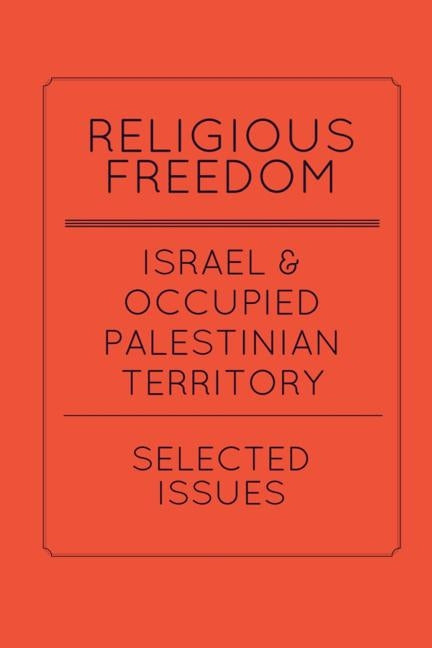1
/
of
1
Sara Husseini
Religious Freedom in Israel and the Occupied Palestinian Territory: Selected Issues: A Report to the United States Commission on International Religio
Religious Freedom in Israel and the Occupied Palestinian Territory: Selected Issues: A Report to the United States Commission on International Religio
Regular price
$9.99 USD
Regular price
Sale price
$9.99 USD
Unit price
/
per
Couldn't load pickup availability
Share
The United States Commission on International Religious Freedom was established nearly 20 years ago to monitor religious freedom around the world and makes policy recommendations to the President, the Secretary of State, and Congress. However, the USCIRF has never reported on religious freedom in Israel and the occupied Palestinian territory (oPt). This report analyzes select issues of religious freedom in Israel and the oPt - issues affecting the Jewish, Christian and Muslim communities - under international human rights law, international humanitarian law, and the USCIRF's own precedent. While not a comprehensive survey, the report establishes that the religious freedom violations identified and analyzed are part and parcel of Israeli state policy. According to the Zionist vision upon which the state was founded, Israel is to be a "national home for the Jewish people." That vision remains the animating force behind Israeli law and policy, which seek to establish territorial control over the entirety of Mandatory Palestine and maintain the dominant, privileged position of the Jewish population relative to the Arab Palestinian population. Israel maintains this system of ethnoreligious dominance in part by preserving the unity of the Jewish population - often at the expense of non-Orthodox and secular Jews - while promoting the fragmentation of the Palestinian population along religious lines. The report is in three parts. The first part, "Extending Ethnoreligious Control over Mandatory Palestine," examines state practices that seek to increase the Jewish character of Israel and Israeli control over the oPt, to the detriment of Palestinian citizens and residents. These measures include a ban on family reunification, which since 2002 has prevented Palestinian citizens and permanent residents in Israel from living with spouses who are residents of the West Bank or the Gaza Strip; encroachment on Muslim self-governance at the Al-Aqsa Mosque Compound/Temple Mount; state support of movements seeking to assert Israeli sovereignty over the Compound and Israel's failure to prevent incitement to sectarian and nationalist violence, including rhetoric advocating the destruction of Al-Aqsa Mosque; legal recognition and adequate protection for Jewish holy sites only, thereby exposing Christian and Muslim holy places to neglect and commercial exploitation; and restrictions on clergy visas, which interfere with the ministry and pastoral responsibilities of many Christian communities. The second part, "Preserving the System of Ethnoreligious Control," examines Israeli practices aimed at maintaining the unity of the privileged Jewish population, including Orthodox Jewish control over personal status matters of all Jewish Israelis; failing to protect the right of proselytism by failing to prevent harassment by anti-assimilation and anti-miscegenation groups; and issuing national IDs that disclose the holder's religious affiliation, which violates human rights law and fuels various forms of state and private discrimination. The third and final part, "Promoting the Fragmentation of Arab Palestinian Identity," examines Israel's recognition of an Aramean nationality that is not a bona fide religious or linguistic minority as defined by international human rights law and is overwhelmingly rejected by Palestinian Christian institutions and clergy, while refusing to recognize a nonsectarian Israeli nationality or minorities within the Jewish population. The third part closes with a discussion of Israel's refusal to allow its Palestinian Druze citizens to conscientiously object to serving in the military against fellow Palestinians, while maintaining an en masse exemption for Haredi Jews on grounds unrelated to pacifism. This report seeks to bring the deteriorating state of religious freedom in Israel and the oPt to the attention of the USCIRF and the international community.
Binding Type: Paperback
Author: Husseini, Sara
Published: 04/13/2016
Publisher: Palestine Works
ISBN: 9780692688243
Pages: 226
Weight: 0.68lbs
Size: 9.02h x 5.98w x 0.48d
View full details
Binding Type: Paperback
Author: Husseini, Sara
Published: 04/13/2016
Publisher: Palestine Works
ISBN: 9780692688243
Pages: 226
Weight: 0.68lbs
Size: 9.02h x 5.98w x 0.48d


